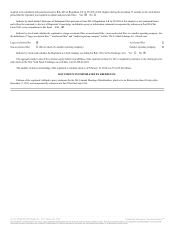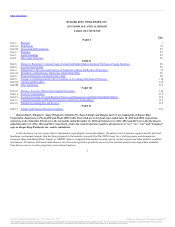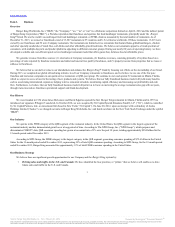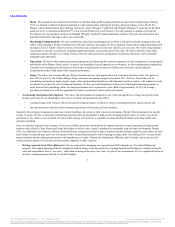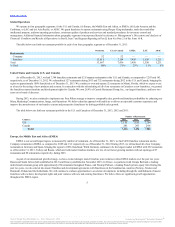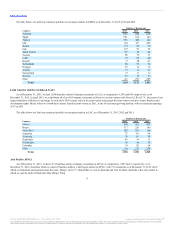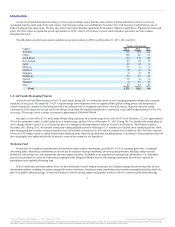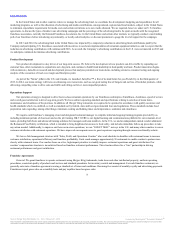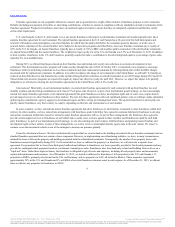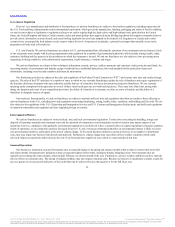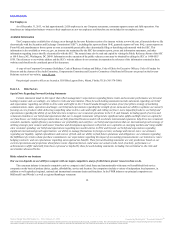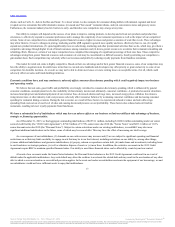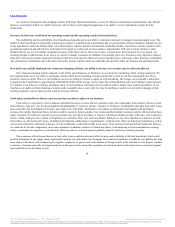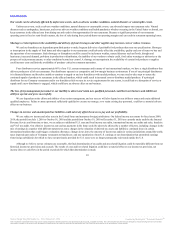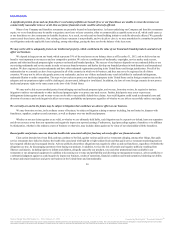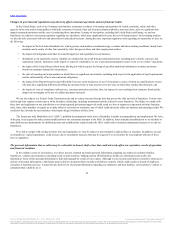Burger King 2013 Annual Report Download - page 13
Download and view the complete annual report
Please find page 13 of the 2013 Burger King annual report below. You can navigate through the pages in the report by either clicking on the pages listed below, or by using the keyword search tool below to find specific information within the annual report.
Table of Contents
General. As a manufacturer and distributor of food products, we and our franchisees are subject to food safety regulations, including supervision by
the U.S. Food and Drug Administration and its international equivalents, which govern the manufacture, labeling, packaging and safety of food. In addition,
we may become subject to legislation or regulation seeking to tax and/or regulate high-fat, high-calorie and high-sodium foods, particularly in the United
States, the United Kingdom and Spain. Certain counties, states and municipalities have approved menu labeling legislation that requires restaurant chains to
provide caloric information on menu boards, and menu labeling legislation has also been adopted on the federal level. Regulators in Canada and in other
countries have encouraged the food industry to take steps to reduce the level of exposure to acrylamide, a potential carcinogen that naturally occurs in the
preparation of foods such as French fries.
U.S. and Canada. We and our franchisees are subject to U.S. and international laws affecting the operation of our restaurants and our business. Each
of our restaurants must comply with licensing requirements and regulations by a number of governmental authorities, which include zoning, health, safety,
sanitation, building and fire agencies in the jurisdiction in which the restaurant is located. We and our franchisees are also subject to laws governing union
organizing, working conditions, work authorization requirements, health insurance, overtime and wages.
We and our franchisees are subject to laws relating to information security, privacy, cashless payments and consumer credit, protection and fraud. An
increasing number of governments and industry groups worldwide have established data privacy laws and standards for the protection of personal
information, including social security numbers and financial information.
Our franchising activities are subject to the rules and regulations of the Federal Trade Commission (“FTC”) and various state laws and similar foreign
agencies. The rules of the FTC and those of a number of states in which we are currently franchising regulate the sale of franchises and require registration of
the franchise disclosure document with state authorities and the delivery of a franchise disclosure document to prospective franchisees. We are currently
operating under exemptions from registration in several of these states based upon our net worth and experience. These state laws often limit, among other
things, the duration and scope of non-competition provisions, the ability of a franchisor to terminate or refuse to renew a franchise and the ability of a
franchisor to designate sources of supply.
International. Internationally, we and our franchisees are subject to national and local laws and regulations that often are similar to those affecting us
and our franchisees in the U.S., including laws and regulations concerning franchising, zoning, health, safety, sanitation, and building and fire code. We are
also subject to the regulations of the U.S. Citizenship and Immigration Services and U.S. Customs and Immigration Enforcement, and tariffs and regulations
on imported commodities and equipment and laws regulating foreign investment.
We and our franchisees are subject to various federal, state and local environmental regulations. Various laws concerning the handling, storage and
disposal of hazardous materials and restaurant waste and the operation of restaurants in environmentally sensitive locations may impact aspects of our
operations; however, compliance with applicable environmental regulations is not believed to have a material effect on capital expenditures, financial condition,
results of operations, or our competitive position. Increased focus by U.S. and overseas governmental authorities on environmental matters is likely to lead to
new governmental initiatives, particularly in the area of climate change. To the extent that these initiatives caused an increase in our supplies or distribution
costs, they may impact our business both directly and indirectly. Furthermore, climate change may exacerbate adverse weather conditions which could
adversely impact our operations and/or increase the cost of our food and other supplies in ways which we cannot predict at this time.
Our business is moderately seasonal. Restaurant sales are typically higher in the spring and summer months when weather is warmer than in the fall
and winter months. Restaurant sales during the winter are typically highest in December, during the holiday shopping season. Our restaurant sales are
typically lowest during the winter months, which include February, the shortest month of the year. Furthermore, adverse weather conditions can have material
adverse effects on restaurant sales. The timing of religious holidays may also impact restaurant sales. Because our business is moderately seasonal, results for
any one quarter are not necessarily indicative of the results that may be achieved for any other quarter or for the full fiscal year.
11
Source: Burger King Worldwide, Inc., 10-K, February 21, 2014 Powered by Morningstar® Document Research℠
The information contained herein may not be copied, adapted or distributed and is not warranted to be accurate, complete or timely. The user assumes all risks for any damages or losses arising from any use of this
information, except to the extent such damages or losses cannot be limited or excluded by applicable law. Past financial performance is no guarantee of future results.


